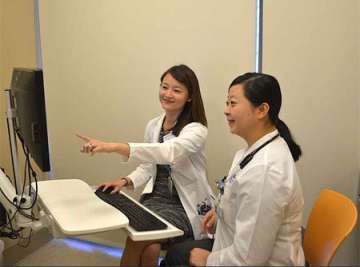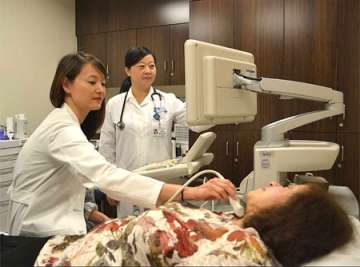UCLA Endocrinology Thousand Oaks
Find your care
We deliver effective, minimally invasive treatments in a caring environment. Call 310-267-7838 to connect with an expert in endocrine surgery.
Bringing comprehensive endocrine services to Thousand Oaks
An Interview with Drs. Amy Chow and Na Shen
What is unique about the UCLA Thousand Oaks Endocrinology practice?

Dr. Shen:
Part of what makes our practice unique is the diverse patient population. Some patients come in with a significant amount of research and knowledge on their condition, while others come in without much prior knowledge. Regardless, we educate patients so that they have a full understanding of their condition and can participate meaningfully in their health care decisions. We have learned to take an individualized approach to each patient.
Dr. Chow:
One of our strengths is that we provide a large range of services in a centralized location. At our Thousand Oaks clinic, we have two endocrinologists, onsite laboratory services and radiology. If a patient needs to get their blood drawn or have imaging done, we can do that in one visit. We receive images on our computers almost immediately and discuss them with patients directly. Having everything centralized in one computer system makes it that much easier to coordinate the care of a patient. Rather than having to make a phone call to another office or waiting for a fax to come in (which may take days), we can look up biopsy results right away on our electronic medical record. We maintain close communication with our endocrinology colleagues at Westlake Village, who perform thyroid biopsies for our patients when necessary.
UCLA integrates the work of endocrinologists and surgeons. How has this medical-surgical overlapimpacted your practice, as well as patient care? What unique services can UCLA provide to patients as a result?
This integration has improved patient care and outcome noticeably. We’re located kind of far from the main campus, where surgeons are traditionally located. Having direct access to an endocrine surgeon, Dr. Livhits, has definitely changed the way that we manage patients with thyroid cancer, parathyroid and adrenal conditions. Dr. Livhits has a Westlake Village clinic every other week for preoperative and postoperative appointments and performs yearly surveillance ultrasounds for patients who have received surgery. As a result, patients do not have to visit a separate radiologist to get imaging done.
The UCLA Endocrine Center has been making efforts to make high quality and specialized care more accessible to all patients. Our goal is to provide a comprehensive care center that mimics the services we have on the main campus in Westwood. We have seen the program expand over the years: from having just one endocrinologist to now having multiple endocrinologists and a surgeon to provide care to our local community. Academic centers don’t replicate themselves in the community the way that UCLA has.
What is a common concern (or misconception) patients have about conditions of the thyroid? What would you tell them?
Many patients come to us and say “recently I’ve noticed a lot of weight gain or difficulty losing weight, and feelings of tiredness. I’m concerned about my thyroid.” People tend to focus on the thyroid because it is more common, but in actuality there are a lot of other conditions that can lead to weight gain. If you have any concerns about your thyroid or any of your symptoms, we would be happy to see you to perform a thorough assessment.
Many endocrine conditions can be treated, and outcomes are improved with timely intervention. For instance, having an overactive parathyroid can lead to osteoporosis and kidney stones down the line. Some patients come in with osteoporosis but have undiagnosed hyperparathyroidism. If we are able to catch and address the underlying cause, we can prevent it from worsening.
How are endocrine disorders related to conditions such as obesity?

Hormones are interconnected with so many things in our body. We have an interest in obesity care, because it is intimately tied to the endocrine system. Obesity is related to higher risk in many cancers, thyroid cancer being one of them. A lot of studies show that the risk of thyroid cancer increases incrementally with increases in BMI. We emphasize weight loss for these patients - outside of the benefits it provides for the cardiovascular system, it almost acts like cancer prevention. For example, many of our hypothyroid patients have dyslipidemia (characterized by irregular levels of lipids in the blood), which is an associated metabolic syndrome. When we’re treating hypothyroid patients, we’re not just treating the condition, but also helping their metabolic markers and reducing cardiovascular risk. We see how their endocrine condition intersects with other aspects of their health. In our clinic, we have a machine that performs a bioelectrical impedance analysis to get a more detailed picture of a patient’s body composition.
What UCLA services are available for obesity near the Thousand Oaks location?
The UCLA Center for Obesity and Metabolic Health (COMET) has recently expanded into Woodland Hills. There is a huge need for bariatric surgery, as 40% of our population is obese and of those, 50% qualify for bariatric surgery. Our bariatric surgeons, Dr. Dutson and Dr. Chen, are helping patients locally for preoperative and postoperative appointments in the convenience of your neighborhood. Due to the interconnectedness of endocrinology and obesity management, we frequently see mutual patients. These referrals are arranged by our office, and they do not require any extra work from the patient since we are in the same computer system. We have seen a positive response to this change and are working on expanding this for other services.
If patients are seeking to play a more active role in maintaining their own health, what advice would you give them?
If you have any concerns about having an endocrine condition, visit an endocrinologist! Most insurance plans (PPO’s) do not require a referral from your primary care physician, so you can make a direct appointment. During our visit, we can do workup and see if there are any masses or abnormalities.
What is something that is most satisfying about your work? How would you describe the dynamic of your team?
In endocrinology, you really have to think about the whole body rather than a single organ. Endocrine glands are everywhere and affect everything. The physiology is really neat and the amount of treatment we can provide is pretty impressive. The vast majority of endocrine conditions we diagnose can be treated, whether it be through medication therapy or surgery.
We love it here - there’s a sense of camaraderie among the physicians and staff. We can go down the hall and run patient cases by our colleagues any time. We are not limited by protocol and are given the freedom to do what we love and subspecialize in our interests. Some of us love to do thyroid biopsies, some enjoy obesity management, and others do transgender medicine. We have a tight knit team that, so we talk to each other and make sure each patient is receiving the exact right care that they need.